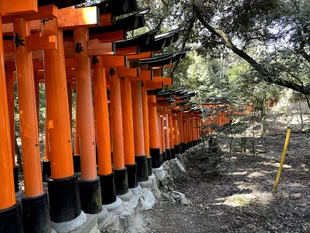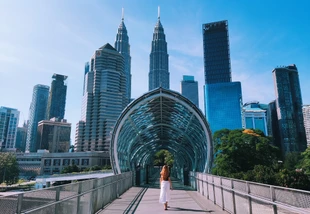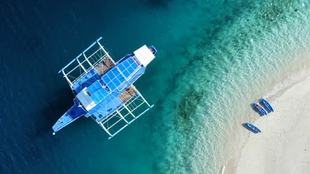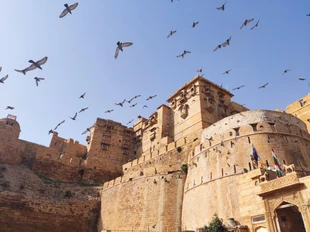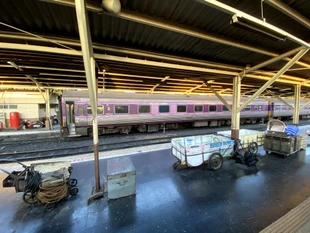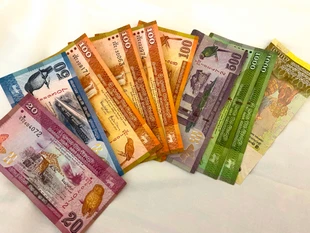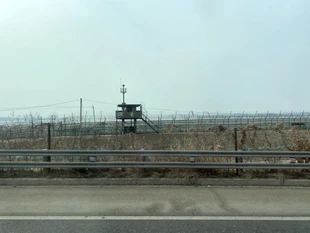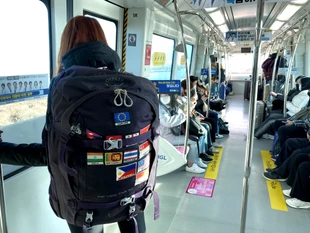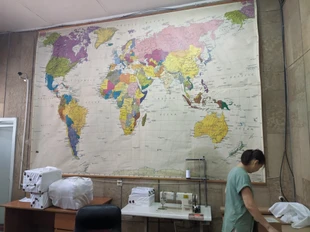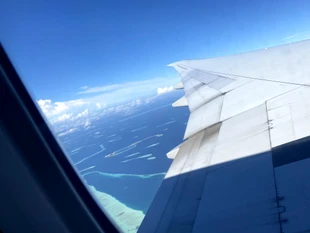10 tips for traveling the world full time whilst working
These are the 10 things I would tell myself if I could go back in time a couple of years.
1. Alternate between calmer periods and active travel periods
If you enjoy traveling, it is easy to plan your digital nomad trip in the same way as you would plan a backpacking vacation: by moving from place to place frequently. This can be a good option if the interesting things in a country are spread out or if visa rules limit your time in a particular country. However, in our experience, it is not sustainable in the long run to combine a full-time job with actually enjoying a country and changing hotels every week or two. For this reason, we recommend alternating between periods of staying in one city and periods of active travel.
We believe that six weeks is the ideal amount of time to spend in a city if you are basing yourself there. Six weeks may seem like a long time, but if you work a full-time job, you only have two days per week that are completely free. In our experience, you will "lose" around one weekend per city to orient yourself and one weekend to plan your activities. This means that six weeks leaves only around eight days to explore further away from the city. One way to think about this is to ask yourself how long you would spend in the region if this was a traditional vacation, and then divide that by two weekend days plus the two "lost" weekends to get the number of weeks you need.
2. Find the apps locals use
Many countries will use a different set of apps than you might be used to. Take mapping applications for example: In Central Asia you won't find most businesses on Google Maps, because instead 2gis is the most popular solution. In South Korea the government blocks most features on Google Maps, so you have to use Naver Maps or Kakao Maps. And in many non-western countries the maps from Open Street Maps (used by applications like Mapy.cs, Maps.me and Apple Maps) are far more detailed than Google Maps.
An even more intriguing example of this is the use of Instagram in Central Asia. If you want to find a hotel, travel agency, or beauty salon, they will often only be on Instagram, where they will even publish their price list for example as images, rather than having a website or being on TripAdvisor or something.
The point of this is simply that it's really easy to grab the apps you're used to, especially when they are available, but the experience might be different than the one from home.
3. Internet: Stability over speed
On the one hand, internet connections have improved globally to a surprising degree. Far more places have the minimum internet speeds required for simple video calls and normal work than I initially expected. The main bottleneck will not be internet speed as much as internet stability. 50 mbps will not be of any use if the speed drops to 2 mbps every half an hour for a few minutes. Of course, if you have a job that does not require a stable connection, this is not an issue. However, if you do, I recommend:
-
If you're not traveling alone (and maybe even if you are) always get sim cards from different providers. In most countries outside of the western world this won't hurt your wallet, and it will allow you to test the coverage with different providers to use the best one if the wifi coverage from your accommodation won't work well enough. We've had numerous accommodations where we had to rely 100% on our phone hotspots for work, and although the hotspot dance isn't the most fun, at least we never ended up forced to move accommodations due to internet connectivity problems. (Tip related to hotspots, some providers disallow hotspots officially, it's worth having a phone that isn't too 'obedient' (e.g. iPhones are notoriously obedient) and allows you to create a hotspot even if your provider doesn't want you to. Similarly, get a smartphone that can create a hotspot from a WiFi connection, as it will occasionally happen that the WiFi isn't bad, but just weak.)
-
A phone with a physical dual SIM card slot offers the greatest flexibility, as it allows you to insert two SIM cards from local providers, or one SIM card from home and one local SIM card. eSIMs are undoubtedly the future, but they are typically either far more expensive (for $5 you might for example get 1GB with an eSIM or 20GB-30GB with a physical SIM in Central Asia) or not available at all (except in a few countries such as Japan and South Korea). The ideal travel phone would have a physical dual SIM card slot and eSIM support, but unfortunately, no such phone exists to the best of my knowledge.
If your phone is not physical dual SIM, but it does have an eSIM slot then we would strongly recommend using your eSIM slot for your 'home phone number'.
In our case we had one eSIM+physical SIM phone, and one physical dual SIM phone between the two of us, which worked decently well. It allowed us to use eSIMs in Japan and South Korea (where we didn't get any physical SIM), whilst for the rest of the world it still gave us three physical SIM slots.
-
Finally, we recommend always purchasing from official stores. This is often cheaper (especially compared to purchasing a SIM card at the airport) and decreases the likelihood of a variety of issues, such as lacking local phone registration and being kicked off the network, or being unable to install the official app from the provider because it is not registered in your name.
4. Don't spend so much that you always get the same experience
Nearly everywhere in the world if you spend enough money you can get a fully western experience. From soft mattresses, to comfortable buses, to food from home and European style toilets. My advice is to occasionally go cheap even if you can afford the more expensive options, because the cheap options will give you experiences that are totally worth it. When you come into a supermarket you will find out that the products you're used to buying are suddenly priced completely differently, and you can either buy the things you're used to buying, or you can buy the things the locals buy and adjust your cooking accordingly. And I am not talking about trying crazy exotic things (go for it if you enjoy that, but that's not for everyone 😅), just about letting the local culture and customs affect your travel.
5. Find a travel friendly banking solution (and have backup cards)
This is purely a money saving tip, but there are a couple of ways traditional banks can make money off of your travel. First of all there are explicit fees (e.g. our main bank takes €2,25 + 1.2% per withdrawal outside the EU) and then there are the exchange rates (e.g. our main bank has between 1% and 2% difference between the buy and sell rates). So as an example, withdrawing 6000 Philippine pesos at the time of writing would cost €104.69, whilst doing the same with our more travel friendly bank would cost €100.30. That's a 4.3% difference, which might not sound like a lot, but quickly adds up (especially when you're in a cash only country). The problem is that you can typically not sign up and receive a physical card once you start your travels, so do your research beforehand.
Often the banks which provide the best exchange rates are not the banks that are the most established. For this reason we decided to keep most of our money in more traditional established banks, whilst we use travel friendly banks for our local spending.
6. Prepare for theft
As a traveler from the Western world, you are at a much higher risk of theft compared to the local population. Even if you consider yourself a poor traveler, your financial situation is still much better than the average person from non-Western countries. Additionally, the consequences of losing your belongings are more significant for you than for other short-term tourists because you won't be able to return home quickly.
Considering these factors, it is wise to prepare for the possibility of having your belongings stolen either from your accommodation or from you while you're outside. The most critical items to protect are your travel documents, as everything else can be replaced without requiring you to travel back home. Therefore, if it is possible in your country of residence, we recommend obtaining a second passport. This way, you can keep one travel document in your accommodation while carrying the other one with you.
Furthermore, it is important to consider how you appear to potential thieves in general. Growing up in the Netherlands, owning a bicycle was common, and when you left your bicycle in a bike park, you had two options: either make sure your bicycle wasn't the most expensive one or ensure that your security measures were significantly better than others. The same principle applies to travel: either you can only stay in high-end accommodations with good security and hide your belongings in inconspicuous places like your shoe or hidden pockets, or you need to make yourself appear as a less attractive target. You can achieve the latter by avoiding items that attract attention, such as high-end phones, fancy smartwatches, expensive jewelry, or branded clothing.
7. Get a smaller backpack than your initially think you will need
One harsh reality of travel is that no matter the size of your backpack, you'll always manage to fill it up, and you will always feel like you need everything you packed at the start of your travel whilst by the end you realize you overpacked. My advice would be to just short circuit the entire thing by 1) getting a backpack one size smaller than you think you will need and 2) pack a couple of items in your backpack that you expect to throw away within a couple of months. The former will force you to be more selective, whilst the second will allow you to adjust your load out when you find out that you need different things.
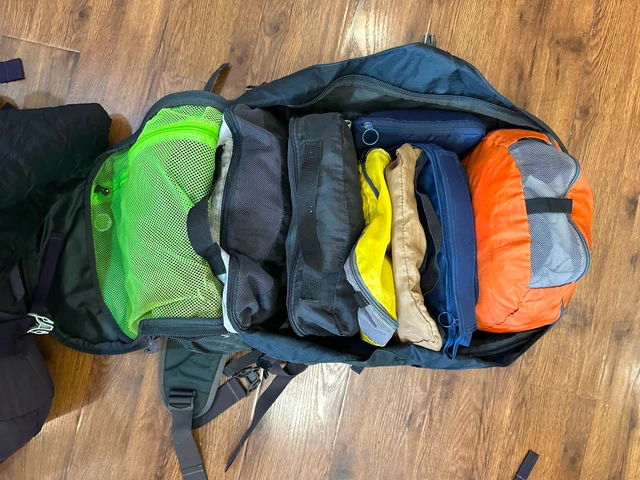
Tip from my wife: You won't be able to wear your makeup from home in warmer more humid climates, so just skip packing it from the start.
8. Travel health insurance... maybe not?
Take the time to carefully assess your travel insurance situation. Many travel blogs will heavily promote travel (health) insurance due to the commissions they will get when you sign up, but it's important to evaluate whether it truly makes sense for you, especially if you already have free and/or obligatory health insurance back home.
The first reason to consider not getting travel health insurance is that insurance always is expected to cost more than what you pay for it on average (someone has to pay for the insurance company to run). The reason to often get insurance anyway is because it gives you certainty that a health issue is not going to ruin you. The problem however is that when abroad you're always expected to pay upfront, so no matter what you need enough savings to pay for any health issues that pop up. Good news: Healthcare is a lot cheaper in most of the countries you will visit. And if something serious pops up: In the large majority of cases you will get the immediate care you need abroad, whilst for long term treatments you can 'just' head home.
The other reason to consider not subscribing? Because basically all the cheap providers have pretty bad reviews when you look into it. And once you get to the travel insurance providers that actually will do their job when you need it the cost is so crazy high that it only might make sense if you don't have health insurance at home.
9. Outward travel documents
Many countries require outward travel documents when you enter a country. When you exit a country by local bus or train however it's often not possible to book these tickets weeks in advance, thus making you officially ineligible to enter the country. Ironically enough a lot of countries require this on paper, but don't actually care unless you get flagged for some unrelated reason. The problem is that when you fly into a country the airline is fined if you get blocked from entering, thus airlines will often more carefully check your documents than the border guards themselves will.
So, here is a guide on how to approach this: Try to enter the country over a land/sea border. This will both allow you to see a lot more of the country and give you far more unique experiences, but it's also more ecologically responsible and often cheaper as well.
-
If that's not possible: Find a Timatic based entry documents checker. Timatic is a company that provides most airlines with information on which documents you need to enter a country. If this system includes a notice that outward travel documents are required the airline is likely to care, if this system does not include such a notice you are good to go.
-
If it does require outward travel documents: Try to buy tickets for the travel you actually intend to use.
-
If that's not possible: Try to find a local airline that provides fully refundable air tickets. You might still pay a couple of euros in exchange rate fees and similar costs, but it's not too bad. I personally do always feel bad though for the airline when I am booking their tickets whilst I don't intend to use them 😞 .
-
If that's not possible: There are services that will basically book fully refundable tickets for you and then cancel them for you. They will charge around €15 for this service, but I would only use them as a last resort.
10. Have realistic expectations
The lifestyle of a digital nomad differs greatly from traditional long-term backpacking. As a digital nomad, you won't engage in local work and your stay in each country won't be long enough to fully immerse yourself in the local culture. It's essential not to deceive yourself into believing that being a digital nomad is significantly different from being a tourist on a week-long vacation in a foreign country. Your job and friends will still be based back in your home country, meaning you will largely remain rooted in your own cultural environment.
That's not to say that digital nomadism doesn't have many great advantages over traditional travel. You'll have ample time to explore and enjoy local cuisine, and there are also financial and ecological benefits (eliminating the need for long-distance flights for vacations). Nevertheless, if you're seeking a more profound and immersive experience, you may find yourself disappointed.
Personally, I made a conscious effort to delve into the history of the countries I visited and attempted to read local news articles using Google Translate. Could I have done the same research from the comfort of my home? Undoubtedly, but being physically present in each country provided added motivation and understanding the history and culture a bit allows one to see the country through different eyes.
